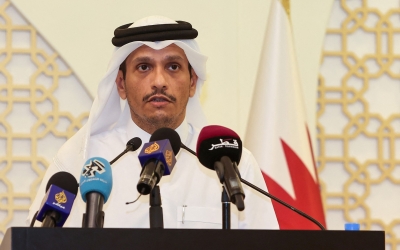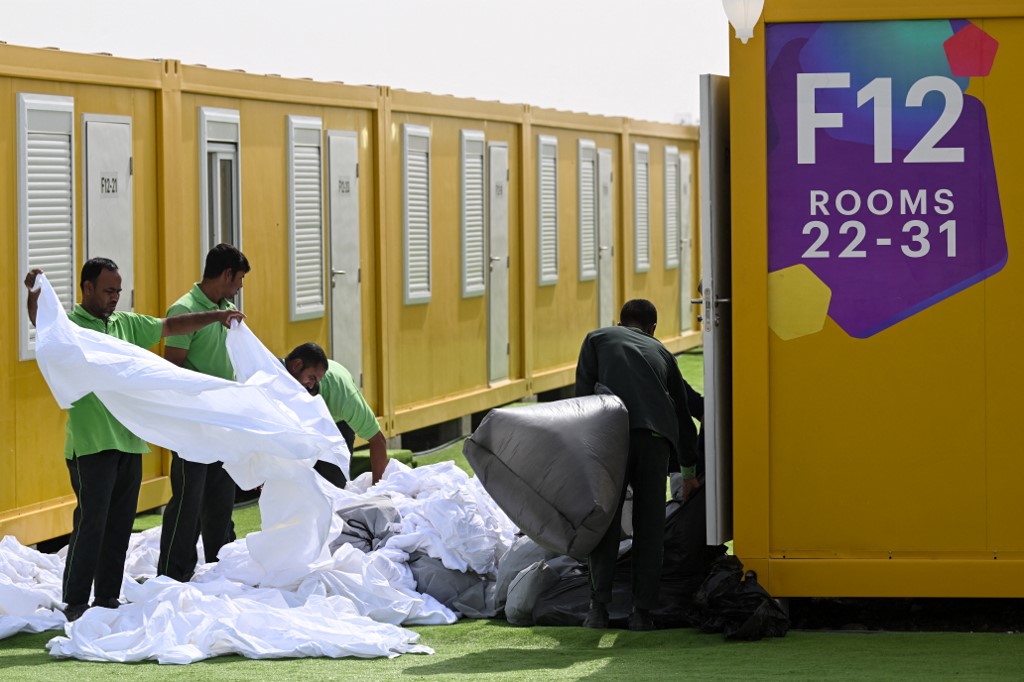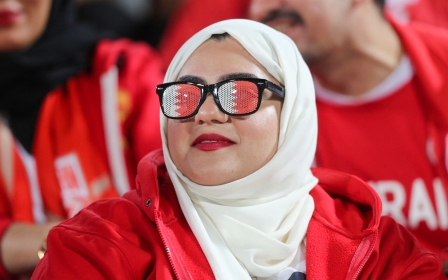Qatar World Cup: Firms 'hid workers' during stadium inspections, report alleges
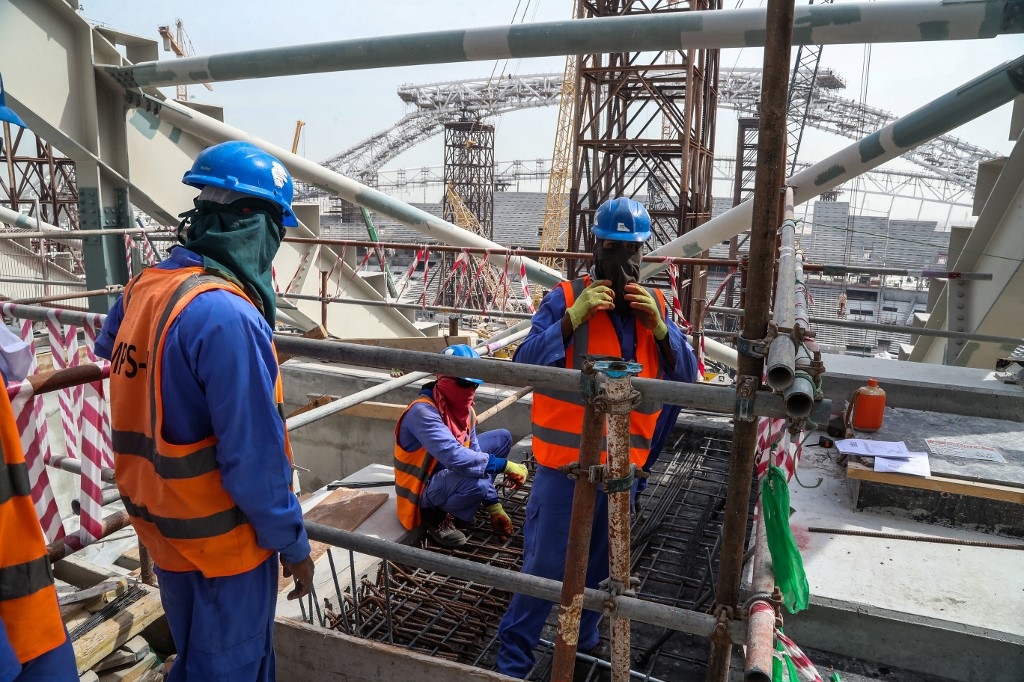
Construction companies in Qatar reportedly hid workers during official inspections of World Cup stadiums to stop them from complaining to Fifa and Qatari officials, a new report has alleged.
Human rights group Equidem said in a report on Thursday that African and Asian workers at World Cup construction sites faced physical abuse and were subject to numerous labour law violations.
Workers from Bangladesh, India, Kenya, Nepal, and other parts of the global south told the London-based NGO that human rights violations took place across all eight Fifa World Cup 2022 stadiums.
Speaking to a total of 982 workers employed at all the venues, the migrant workers said they were subject to discrimination, physical abuse, injury, unfair recruitment, and poor working practices.
Shreya, a Nepali worker at Lusail stadium, Qatar's flagship venue of the World Cup, said workers who complained risked being sent home or having their salaries deducted.
The Nepali worker said many workers wanted to voice their concerns and waited for Fifa and Qatari officials to visit the venue.
According to the worker, instead of letting them speak to Fifa, officials with the Hamad bin Khalid Contracting company (HBK), who were the main contractor at Lusail stadium, reportedly "rang the fire alarm on purpose" and send them back to their camps - two hours before football's governing body visited.
"Everyone was sent to camp. There was no worker on site," recalled Shreya, who chose not to use their real name.
"At first, people believed those fire alarms. Everyone used to come out whenever the alarm rang. After this happened about two or three times, people stopped coming out."
Middle East Eye reached out to HBK for comment but they did not respond by the time of publication.
Physical abuse
An Indian construction worker also employed at Lusail stadium said workers reportedly faced a salary cut or were fired if they spoke out.
"If we protest, they threaten to cut our salaries, or they fire us. Supervisors shout abuse, and sometimes even beat workers," the Indian worker told Equidem.
"This is why no one protests. If I complain, I will be abused, threatened with dismissal, and the duty will be made stricter for me."
Another Kenyan worker at Lusail stadium told Equidem that supervisors would "regularly hit" them so they would complete tasks "faster".
"Supervisors would hit us in front of other workers to pressure us to work faster and complete our work on time," the Kenyan worker said.
"This physical abuse was never addressed. You could report but nothing would happen because the perpetrators were our supervisors."
Mustafa Qadri, the CEO of Equidem, estimated that thousands of workers were owed compensation for illegal recruitment charges, unpaid wages, and other issues they faced while working in Qatar.
"Qatar, Fifa, and their partners stand to earn billions from this tournament, yet the workers who built the stadiums have had their money stolen and their lives ruined," said Qadri.
"As the world's spotlight turns towards the World Cup, this report highlights workers who refuse to stay hidden and are bravely calling for their freedoms.
"Fifa can no longer turn a blind eye and should set up a compensation fund immediately."
A Fifa spokesperson told MEE that the well-being of Fifa World Cup workers was an "important priority" for the governing body and that it had mechanisms to ensure this.
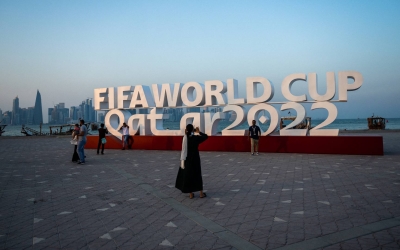
"These mechanisms included, for example, occupational health and safety measures on-site, comprehensive medical checks of all workers, as well as projects to address other potential causes of health hazards, such as heat, nutrition, mental health, or Covid-19," the spokesperson said.
A Qatari government official told MEE that the country had "overhauled" its labour system over the last two decades and was "leading the region on labour rights".
The official also called on Equidem to encourage the respondents in its report to lodge complaints through "the proper channels".
"$350 million has been paid out this year through the Workers’ Support and Insurance Fund to compensate workers who have unfortunately been injured or passed away because of a work-related incident or to workers who have not received their salaries due to their employer being unable to pay," the spokesperson said.
"The door is open for NGOs to come to us if they believe improvements can be made to the current compensation fund. Unfortunately, several NGOs continue to pursue initiatives that fall outside the parameters of our labour reform programme, which was developed in consultation with trusted global partners."
The Supreme Committee for Delivery and Legacy of the Qatar World Cup also said it was "proactively" investigating all worker-related deaths.
The committee denied the claims made by Equidem and said that "it would be practically impossible to cover up or fail to properly disclose a worker-related fatality" in Qatar.
Pressure to reform
Like other nations that have hosted the World Cup tournament, Qatar has come under intense scrutiny from human rights groups over its treatment of migrant workers.
Last month, Amnesty International said that workers in Qatar "continue to face abuses on a significant scale" despite the country implementing a series of reforms to help workers.
It noted that thousands of workers employed on World Cup-related projects had benefited from improved working and living conditions over the past decade.
But it said thousands of workers' deaths since 2010 remained unexplained, with hundreds of them likely to be linked to exposure to Qatar’s extreme heat in many months of the year.
Steve Cockburn, Amnesty International's head of economic and social justice, said: “Although Qatar has made important strides on labour rights over the past five years, it’s abundantly clear that there is a great distance still to go.
"Thousands of workers remain stuck in the familiar cycle of exploitation and abuse thanks to legal loopholes and inadequate enforcement."
In August, MEE reported that Qatar had deported dozens of workers who held a rare protest over unpaid salaries. Equidem told MEE that at least 60 people detained by Qatar had been deported back to their country of origin.
Workers and trade union representatives told Migrant Rights, a rights group focused on worker's rights in Gulf countries, that the company had promised to give them their salaries on 11 August.
But when they were denied their wages and had the electricity cut from their company-owned accommodation, the workers went on strike. At least 200 workers took to the streets of Doha on 14 August to demand their unpaid wages.
Middle East Eye delivers independent and unrivalled coverage and analysis of the Middle East, North Africa and beyond. To learn more about republishing this content and the associated fees, please fill out this form. More about MEE can be found here.


